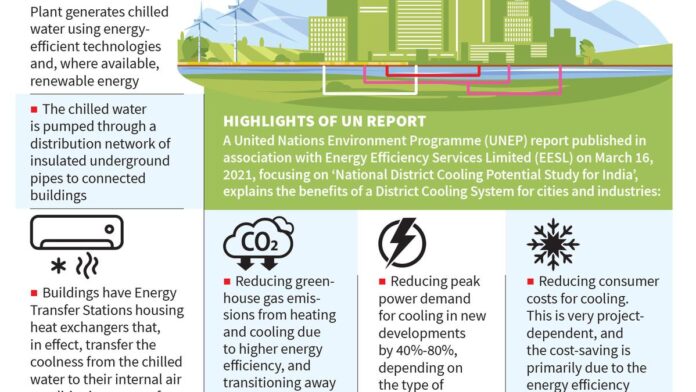To minimise the burden on electricity grids and promote energy conservation, a District Cooling System (DCS) is being strongly considered as an alternative environment-friendly cooling solution, according to an analysis by the State Planning Commission (SPC).
The panel’s report said DCS could help Tamil Nadu sustainably manage water through effective reuse, lowering heat island effects, providing sustainable cooling for all, and reducing emissions from power plants.
DCS is a centralised cooling system that distributes chilled water to multiple buildings through a network of underground insulated pipes. These buildings use chilled water for air conditioning or industrial process cooling.
SPC Vice-Chairman J. Jeyaranjan said that while cooling was essential for human comfort and health, industrial process, and food preservation, higher electricity demand could boost greenhouse gas emissions. “The challenge is to develop efficient cooling technologies that minimise the burden on electricity grids and promote energy conservation. District cooling is being strongly considered as an alternative environment-friendly cooling solution, as it integrates other supply-side technologies and systems to optimise resource use and reduce energy consumption and associated emissions,” he said.
The report, titled, ‘Opportunities for District Cooling Systems in Tamil Nadu’, provides recommendations on how the State government could implement this model. It also outlines the relevant departments and agencies that could support the implementation.
Tamil Nadu could start by developing public DCS in State-owned facilities such as government buildings, hospitals, or educational campuses in Chennai or Coimbatore, which require substantial cooling loads. Private companies could be encouraged to develop DCS in high-demand private real estate clusters, such as Special Economic Zones, IT parks or large commercial complexes on Chennai’s Old Mahabalipuram Road or Coimbatore’s TIDEL Park, or at the new developments happening in cities such as Thoothukudi and Madurai, it said.
Tamil Nadu could adopt a District Cooling Policy that sets clear standards for private developers, including tariff regulations, performance benchmarks, and energy efficiency goals. The government could offer tax incentives, streamlined land acquisition processes and other measures to attract investment. Tangedco or municipal corporations such as the Chennai Metropolitan Development Authority could own and manage these systems. This would allow the State to maintain low tariffs, support public infrastructure, and integrate cooling systems into overall energy management. District cooling providers such as Tabreed, ENGIE or Danfoss may directly finance or co-finance DCS as part of their service delivery model, it said.
These projects could be funded through State Budgets, subsidies from the Central government under the Smart Cities Mission, or international funding through organisations such as the United Nations Environment Programme or the Asian Development Bank, which support green infrastructure projects. Another recommendation was establishing a State Cooling Regulation Body to oversee private cooling providers and ensure fair pricing and service quality while maintaining environmental sustainability.
On the challenges and threats, the SPC said uncertainties in energy prices could impact the economic viability of DCS when compared to traditional AC units. The upfront cost of installing a DCS could be high, potentially discouraging adoption. Lack of awareness on the benefits of DCS and technical expertise may hinder implementation, it said.
Published – December 17, 2024 11:54 pm IST
